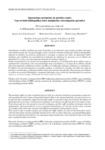Operaciones portuarias de petróleo crudo: Una revisión bibliográfica sobre simulación e investigación operativa

Use this link to cite
http://hdl.handle.net/2183/31246Collections
- Investigación (FEE) [923]
Metadata
Show full item recordTitle
Operaciones portuarias de petróleo crudo: Una revisión bibliográfica sobre simulación e investigación operativaDate
2021Citation
DE LA PENA ZARZUELO, Ignacio; FREIRE SEOANE, María Jesús y LOPEZ BERMUDEZ, Beatriz. Port operations on crude oil: A bibliographic review on simulation and operations research. Ingeniare. Rev. chil. ing. [online]. 2021, vol.29, n.3, pp.406-419. ISSN 0718-3305. http://dx.doi.org/10.4067/S0718-33052021000300406.
Abstract
[Resumen] Actualmente, el tráfico marítimo de crudo de petróleo y sus derivados sigue siendo un tráfico relevante, tanto desde un punto de vista geoestratégico como a nivel de volumen transportado. Dado el desequilibrio regional en términos de reservas, producción y consumo, se genera, por tanto, un importante tráfico marítimo, pero también una necesidad de la industria de optimizar los procesos con el objetivo de minimizar los costes y dar una respuesta eficiente en términos logísticos.
Desde esta perspectiva, las técnicas de investigación operativa y la modelización de los tráficos para su optimización se presentan como una metodología muy conveniente y, a lo largo de los últimos setenta años, han empezado a publicarse estudios científicos con diferentes enfoques cualitativos y cuantitativos. El objetivo de esta investigación es recopilar, analizar y clasificar los modelos de tráfico de crudo de petróleo y sus derivados y ordenar la temática de las innovaciones introducidas. Para alcanzar este objetivo se realiza un recorrido bibliográfico conceptual indicando como se han ido introduciendo las sucesivas mejoras y, al mismo tiempo, eliminando las restricciones iniciales.[Abstract] The maritime traffic of crude oil and derivatives is still very relevant, both from a geostrategic perspective and regarding the total volume of liquid bulk shipped. Due to the regional imbalance in terms of reserves, production and consumption, important maritime traffic is generated, and a necessity for the industry of optimizing these processes, with the goal to minimize costs and give an efficient answer in logistic terms. From this perspective, the operation research techniques, and the traffic modeling techniques aimed at optimization, can be presented as a very convenient methodology over the last seventy years, a stream of scientific publications has emerged with different quantitative and qualitative focus. This research aims to gather, analyze and classify the traffic models of crude oil and derivatives and to order the innovation concepts gradually introduced. In order to achieve this goal, conceptual bibliographic research is performed showing how the subsequent improvements have been introduced and, at the same time, erasing the initial restrictions
Keywords
Inventory & scheduling combined problem (PISCP)
Lightering optimization problem (LOP)
Cargo scheduling with blending problem (CSBP)
Pricing
Inventory routing problem (IRP)
Routing and scheduling problem (RSP).
Lightering optimization problem (LOP)
Cargo scheduling with blending problem (CSBP)
Pricing
Inventory routing problem (IRP)
Routing and scheduling problem (RSP).
Editor version
Rights
Atribución 3.0 España
ISSN
0718-3305
Related items
Showing items related by title, author, creator and subject.
-
Effect of algebraic language and problem text wording on problem model accuracy when solving age word problems
Soneira, Carlos; González-Calero, José Antonio; Arnau, David (Springer, 2023-06-19)[Abstract] The use of the algebraic method for solving word problems is a challenging topic for secondary school students. Students’ difficulties are usually associated with extracting the problem’s network of relationships ... -
Asymptotic Analysis of a Problem for Dynamic Thermoelastic Shells in Normal Damped Response Contact
Cao Rial, María Teresa; Castiñeira, Gonzalo; Rodríguez-Arós, Ángel; Roscani, Sabrina (2021)[Abstract] The purpose of this paper is twofold. We first provide the mathematical analysis of a dynamic contact problem in thermoelasticity, when the contact is governed by a normal damped response function and the ... -
Using the Cloud for Parameter Estimation Problems: Comparing Spark vs MPI with a Case-Study
González, Patricia; Pardo, Xoán C.; Penas, David R.; Teijeiro, Diego; Banga, Julio R.; Doallo, Ramón (Institute of Electrical and Electronics Engineers, 2017-07-13)[Abstract] Systems biology is an emerging approach focused in generating new knowledge about complex biological systems by combining experimental data with mathematical modeling and advanced computational techniques. Many ...






